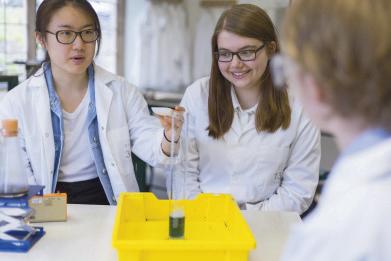
2 minute read
Chemistry
Course outline
AQA
Chemistry is studied in three main branches:
• Physical Chemistry – the understanding of how chemistry works.
• Organic Chemistry – the study of compounds containing carbon (the chemistry of life).
• Inorganic Chemistry – the study of the elements and patterns in the Periodic Table.
In Year 1 you will be given a solid grounding in foundation Chemistry. You will develop your GCSE understanding of the reactivity of atoms and molecules and gain an understanding of atomic and molecular structure. The construction of the Periodic Table is considered and organic chemistry is introduced.
In Year 2 you gain a deeper knowledge and understanding of the three branches of Chemistry. Paper 1 assesses bonding, energetics, equilibria, redox and inorganic chemistry, while Paper 2 assesses kinetics and organic chemistry. The third paper assesses practical skills, data handling and a synopsis of all the theoretical content. All three papers are 2 hours long. There is also a practical endorsement of the experiments carried out through the course.
Chemists are highly valued scientists, providing expertise in the fields of medicine, veterinary science, pharmacy, dentistry, chemical engineering, polymer science, materials science and many other disciplines. For all of these employment areas advanced higher education training is required. Entry to such courses invariably demands Chemistry as an essential qualification.
Chemistry will expand your thinking and help you develop sophisticated models of some abstract processes and structures. It will train you to sort and analyse data, communicating the outcomes using appropriate scientific language. This is a tremendously valuable skill which is well regarded no matter what course of study is pursued beyond A Level.
A Level Chemistry is a challenging and rewarding course of study, which requires absolute commitment to make a success of the subject. The calculations aspect of the course requires a good Mathematical grounding from GCSE.
There are many opportunities to get involved in additional activities. Why not come along to the Sixth Form Science Society, help out with the KS3 Science Club or offer to mentor a younger student in their studies. For potential medics and vets we run a Medical Society for you to meet, discuss and debate the requirements of your chosen careers. Many students subscribe to Chemistry Review for extra reading.











